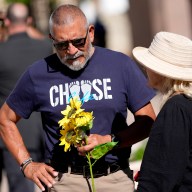 Palestinian spy Mosab Hassan Yousef and Israeli Shin Bet handler Gonen Ben Yitzhak recreate their old working relationship in “The Green Prince.”
Palestinian spy Mosab Hassan Yousef and Israeli Shin Bet handler Gonen Ben Yitzhak recreate their old working relationship in “The Green Prince.”
Credit: Music Box Films
‘The Green Prince’
Director: Nadav Schirman
Genre: Documentary
Rating: PG-13
3 (out of 5) Globes
There has to be a good reason why a true story so obviously destined to be a crackerjack thriller has instead been made as a documentary nearly entirely filled with talking heads. The tale of Mosab Hassan Yousef, the son of a prominent Hamas leader coerced into serving as a rat for Israel’s shadowy Shin Bet agency, is already being prepped as a full-on movie-movie. And yet there’s a perversity to the documentary “The Green Prince,” which strips a powder keg situation down to nothing but occasionally unmarked blue surveillance footage and two people speaking directly to the camera. It’s so not the way to tell this story that it forces viewers to root around to find what it’s really up to.
On one level, this is a wholesale ripoff of Errol Morris. Director Nadav Schirman borrows the filmmaker’s Interrotron — or at least Interrotron-style — interview process. Yousef and the film’s only other star, Shin Bet operative Gonen Ben Yitzhak, stare into the lens, while Schirman dices up their testimony. Sometimes Yousef and Yitzhak even wind up pushed from the center of the frame to the extreme side. It’s a visual style meant to keep us on edge even as we’re supposed to dwell on the oratory. Reminiscences that would make killer thriller scenes instead have to be pictured in the mind.
 Mosab Hassan Yousef and his father, high level Hamas member Sheikh Hassan Yousef, are seen in archival footage in “The Green Prince.”
Mosab Hassan Yousef and his father, high level Hamas member Sheikh Hassan Yousef, are seen in archival footage in “The Green Prince.”
Credit: Music Box Films
It’s a strategy that seems counterintuitive but which serves to get at something else: The feeling of isolation that’s so extreme that both spy and his not always noble handler — who brags through a grin about his “killer instinct” and other sociopathic tendencies that make him a great protector of Israel — remain cut off from everything. They operate minus their country, their family and each other. Schirman denies viewers all emotional and visceral payoffs, instead grooving on a drawn-out mood of sinister tension (supplied by low lighting and a low throbbing, vaguely melancholic score).
Finally at the end Schirman changes his mind. In the last minutes, the emotional floodgate belatedly opens and we come to see this as a long con that holds back on human interaction in part so that when it comes it affects moviegoers all the more. It also turns “The Green Prince” into something smaller: a tale of friendship that is mostly explained by each individually rather than together. (It’s not all that different, in a way, from the two-part version of “The Disappearance of Eleanor Rigby,” only Yousef and Yitzhek share even less screentime.)
But it’s still unusually perceptive. The stripped-down approach also forces viewers to consider the ideas and themes, rather than be distracted by thrills. It gets more into the nitty gritty of turning turncoat, as well as into the Israel-Palestine conflict, which it views clinically. We’re not distracted by visuals or exciting scenes or even constant footage of the two subjects at the time. (Even Yousef’s father being viewed only in archival footage turns him into something abstract rather than real.) “The Green Prince” plays like an analysis of a corker of a tale, picking its story apart and laying all its parts bare to see if it can be viewed from another, possibly more vital angle, one that asks the questions and highlights the issues most films dodge.
Follow Matt Prigge on Twitter @mattprigge













